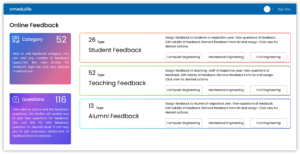On June 13, 2014, India’s National Board of Accreditation (NBA) became a permanent signatory member of the Washington Accord, laying forth a set of explicit standards for Indian institutes to achieve Outcome-Based Education (OBE). This entails developing a set of unified Program Education Objectives (PEOs), Program Outcomes (POs), and Course Outcomes (COs), as well as assuring their outcomes and achievement.

NBA accreditation is found to be most demanding as we can not stop counting its benefits for students and institutions as well.
Quality criteria are verified
Students are ensured with high-quality teaching when a specific engineering course is NBA accredited. This eliminates the need for students to undertake their own extensive study in order to evaluate a school and its programs while applying to colleges. The fact that NBA-accredited engineering universities typically have larger student enrollments attests to this.
It serves as a gauge for prospective students of the college’s dedication to quality. Students also benefit from the NBA accreditation strategy to promote excellence in technical education, which includes a process of continuous quality improvement.
Enhances the institution’s trustworthiness
NBA Accreditation pushes institutions to leave no stone unturned to achieve and maintain their high standards. As a result, the public’s faith in them grows, so does responsibility. This enables prospective students and their families to have confidence in the institution that has acquired accreditation. After all, the knowledge your children get will determine their future career ambitions.
Enhances student achievement
Students who earn a degree from an institution whose programs have been certified as high-quality can be confident in their education. Outcome-Based Education (OBE) is a method of assessing pupils based on three factors: knowledge, skills, and attitude. Furthermore, the facilities and curriculum ensure that the student is prepared for a job when they graduate.
Assists in SWOT analysis and improving results
Engineering colleges can use NBA accreditation to perform a SWOT analysis, which evaluates their strengths, weaknesses, opportunities, and threats. While a SWOT analysis is a fantastic place to start when evaluating a college, it also aids in understanding where the institution is now and how it should proceed. As a result, the college has a constant understanding of how to improve its offerings. You may improve the quality of your programs to distinguish yourself from other engineering schools.
It serves as a foundation for fundraising.
NBA accreditation aids institutions in obtaining essential government funds. Accreditation can certainly be proven to be effective in earning funds that are achieved by performing up to the mark. Institutions may receive funds that are completely based on how wonderful they perform organically.
Achieving Category 1 designation for an institution is not only an honor but also an accomplishment as it introduces the huge plethora of options for colleges. Category 1 technical colleges are allowed the freedom to add new programs, open learning centers, and grow student enrollment both locally and globally. Category 1 institutions can more readily form twinning agreements with global universities and seek research funds.
A Competitive advantage in the job market
Students passing out from NBA Accredited courses are generally found to be in a high-performing group wherever they go. One of the most significant advantages of NBA certification is that more employers will be interested in participating in your college’s placement programs.
Students who graduate from approved universities with a good education have a better chance of finding suitable work. Degrees from accredited programs are more valuable to potential employers because they know the candidate was educated at an institution that has met and maintained industry-specific quality standards.
The world’s educational doors open for deserved students
Because NBA is a signatory to the Washington Accord, students graduating from authorized engineering college programs can opt for further studies at universities in other Washington Accord signatory nations. This allows engineering graduates who want to continue their education abroad to move around more easily.

